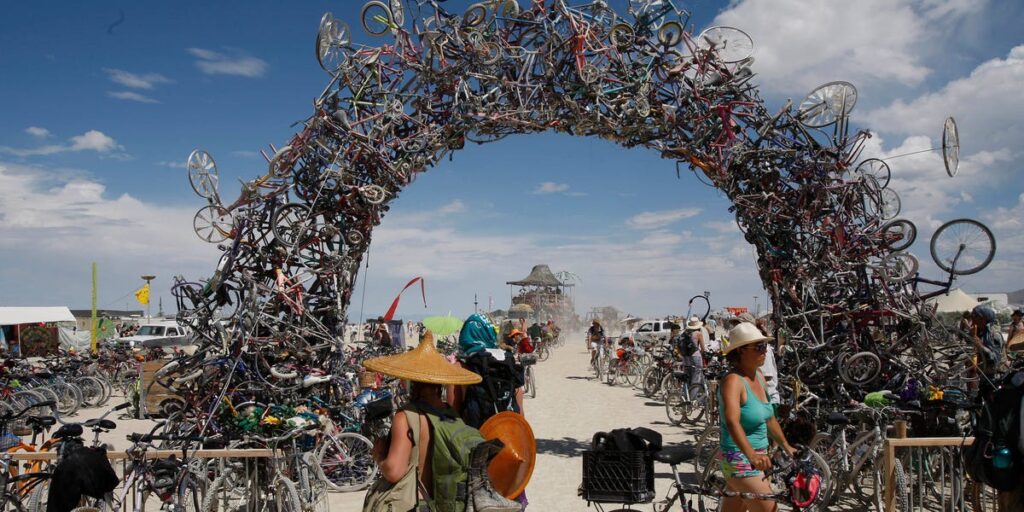The famously anti-capitalist festival Burning Man is in a bit of an ironic pickle: It needs money.
Burning Man Project, the nonprofit organization behind the annual event in Black Rock City, Nevada, is entering its 2025 festival on shaky ground.
“Everything is now at risk,” Marian Goodell, Burning Man Project’s CEO, wrote in a letter requesting donations after last year’s event.
Burning Man, which was born in San Francisco in the 1980s, has gained traction with Silicon Valley elite over the past few decades. Some of the richest names in tech, like Elon Musk, Eric Schmidt, Sergey Brin, and Larry Page, are regular attendees. But in recent years, it has struggled to break even as the costs of putting on the festival have increased and sales of high-priced tickets have not kept up.
So far, things are looking up this year. The organization expects more than 70,000 attendees, a spokesperson told Business Insider. That’s more than the 69,141 who attended last year, according to the festival’s official dispatch.
Donations are also up year-to-date, Goodell said earlier this month. And the festival’s new dynamic ticketing system more accurately reflects its costs. Last year’s standard ticket price, $575, didn’t cover the organization’s cost per attendee, which sat at about $749 in 2023. This year, Burning Man tickets are priced on a transparent sliding scale from “give a gift” — any ticket priced above $750 — to “receive a gift” — the limited number of tickets priced below $750.
Goodell said Burning Man’s “financial outlook is much stronger than where we were a year ago,” when it operated at a financial loss in 2024.
Still, tickets for this year’s festival, which runs from August 24 to September 1, have not sold out as they did each year from 2011 to 2023, less those when the event was called off due to the pandemic. At its peak, in 2019, Burning Man hosted 78,850 attendees.
Last year, after higher-priced ticket sales did not meet expectations, the nonprofit raised its fundraising goal from $10 million at the beginning of the year to $20 million by November to address a shortfall. Thanks to 10% staff cuts and a surge in donations, it squeaked through.
In 2023, the most recent year for which data is available, the organization’s expenses totaled $63.6 million, more than double what they were a decade prior, according to financial filings. Those expenses cover staff and year-round activities, as well as the festival’s basic infrastructure, like toilets, fuel, and medical staff.
Burning Man’s own principles are at odds with its fiscal well-being
Part of Burning Man’s financial problems lies in its very ethos. The event, which took on its current shape as a music and arts celebration in the desert in 1991, revolves around 10 principles, including “radical inclusion” and “decommodification.”
The former means the organization has been historically hesitant to raise ticket prices; it offers financial aid for those who qualify for reduced-priced tickets. For years, the standard ticket did not cover the average cost the organization bears per attendee; the discrepancy between the two peaked in 2022 when a standard ticket cost $475 and the actual cost per attendee was $676.
The event’s roots in “decommodification” mean it eschews corporate sponsorships or merchandise and concession sales that could subsidize ticket sales and donations. Similarly, the organization does not collect licensing fees from the many Burning Man regional offshoots that were attended by more than 100,000 people last year.
The armchair critic may be surprised that an event now synonymous with tech billionaires would be in financial straits. Some of the world’s richest men are regular attendees. But while Burners are getting richer — 37.2% earn between $100,000 and $300,000 annually, compared to 21% 10 years ago, according to an annual volunteer-run census — the majority still earn under $100,000 a year.
Some burners were not thrilled with Goodell’s calls to action last year, commenting on her posts with critiques about the amount that the organization spends on salaries and real estate (Goodell earned $391,000 in 2023, according to disclosures, and its office has an address in an expensive San Francisco area). Others said they want the nonprofit to focus on the annual Burning Man event, not its many charity initiatives, like the disaster relief project Burners without Borders and global artist grants.
The richest Burners have not spoken publicly about the festival’s finances, though they may very well be among those who donated to keep the festival afloat. While the organization does publish a list of donors, there is the option to remain anonymous. For all we know, Sgt Pepper Bm or Uncle Cornelius could be Dustin Moskovitz’s Burning Man alias.
Read the full article here
















